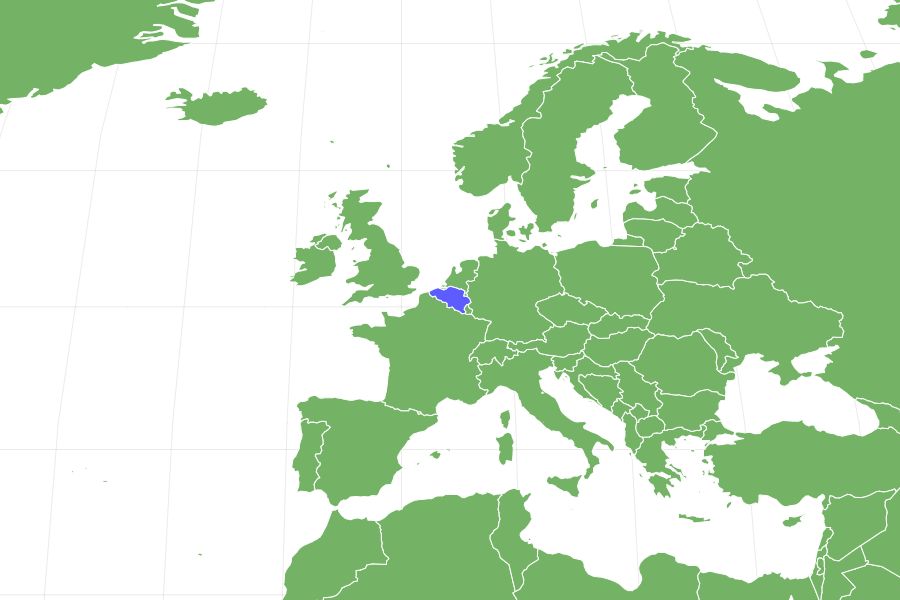Brussels Griffon
Canis lupus
The Brussels Griffon prefers to live with another dog so they have a companion to play with.
Advertisement
Brussels Griffon Scientific Classification
- Kingdom
- Animalia
- Phylum
- Chordata
- Class
- Mammalia
- Order
- Carnivors
- Family
- Canidae
- Genus
- Canis
- Scientific Name
- Canis lupus
Read our Complete Guide to Classification of Animals.
Brussels Griffon Conservation Status
Brussels Griffon Facts
- Fun Fact
- The Brussels Griffon prefers to live with another dog so they have a companion to play with.
- Temperament
- Friendly, cheerful, curious, charming and affectionate.
Brussels Griffon as a Pet:
- General Health
- Energy Level
- Shedability
- Trainability
- Intelligence
- Tendency to Chew
- Size
- Family and kid friendliness
- Yappiness / Barking
- High
- Separation Anxiety
- High
- Preferred Temperature
- Average climate
- Exercise Needs
- High
- Friendly With Other Dogs
- High
- Pure bred cost to own
- $800 to $6,300+
- Dog group
- Toy
- Male weight
- 6-12 lbs
- Female weight
- 7-12 lbs
This post may contain affiliate links to our partners like Chewy, Amazon, and others. Purchasing through these helps us further the A-Z Animals mission to educate about the world's species.
View all of the Brussels Griffon images!
The Brussels Griffon is a mix of multiple breeds, including the Pug, English Toy Spaniel, and Affenpinscher. They were adored by nobility and the working class alike, though an official standard for its appearance was not set until 1883.
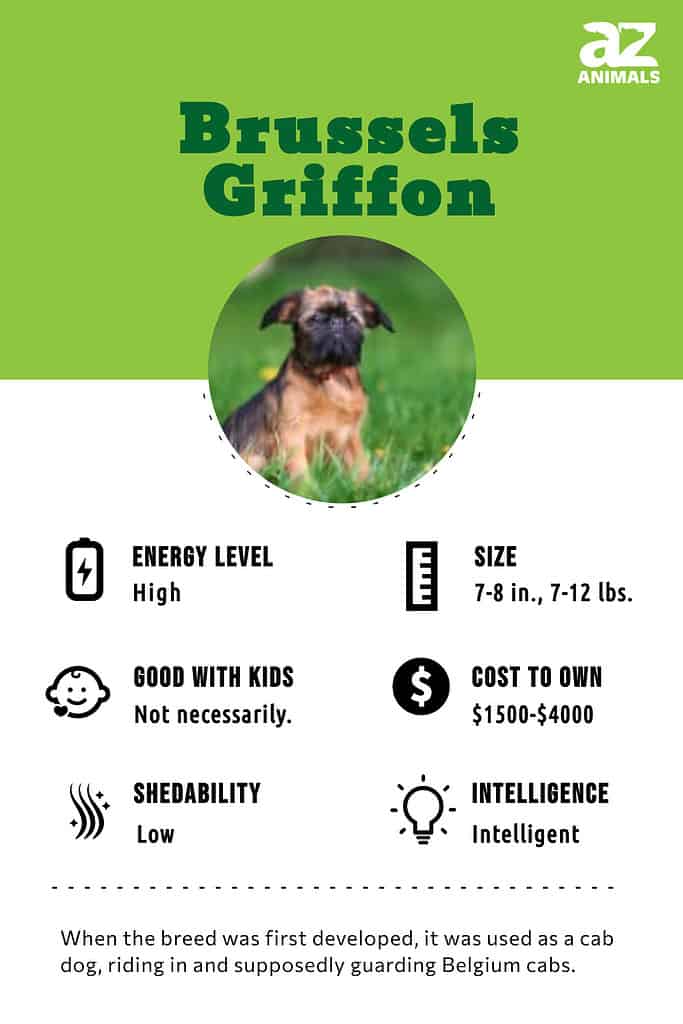
Originally developed as a mixed breed centuries ago, the Brussels Griffon has been a beloved animal since it first appeared. It is, of course, named after the city of Brussels in Belgium. In the 17th century, the German affenpinscher was bred to the Belgian street dog to produce the Smousje, a small rough-coated dog used to control rodents in stables.
See all of our expert product reviews.
In the 19th century this dog was crossed with the pug to get a smooth-coated version. The Brussels Griffon is one of the three variations of the Griffon Bruxellois along with the Belgian Griffon and the Petit Brabancon. The differences are in coat and color only.
The breed almost died out because of the two World Wars, and still it is not common, thus driving up the breeders’ prices, especially for a puppy. Although they are sometimes found in a rescue shelter, genetics plays the biggest role in their health issues and disposition.
This toy dog is quite affectionate and loving, endearing anyone with its bossy personality in such a small size.
3 Pros and Cons of Ownnership
Being realistic about any new pet in the family is important. Consider these pros and cons before adopting a Brussels Griffon of your own.
| Pros | Cons |
|---|---|
| Long lifespan: The Brussels Griffon has an expected lifespan of 12-15 years, which is much longer than many other breeds. | Very vocal: While some people don’t mind the volume, the constant alerts whenever a stranger passes may be a little much. |
| Small size: Due to the limitations of apartment and house renters, the Brussels Griffon size is ideal for individuals that must adhere to size limits in their contracts. | Prone to many health issues: Although the human-like face is appealing to many, the protruding eyes and short nose put this dog at risk for many injuries and illnesses. |
| Loving: Perhaps the most appealing reason to adopt a Brussels Griffon is its adoration since they love to be close to their owner. | Prone to biting: The sensitive nature of this dog can lead it to become fearful if handled incorrectly, leading it to bite in fear. |
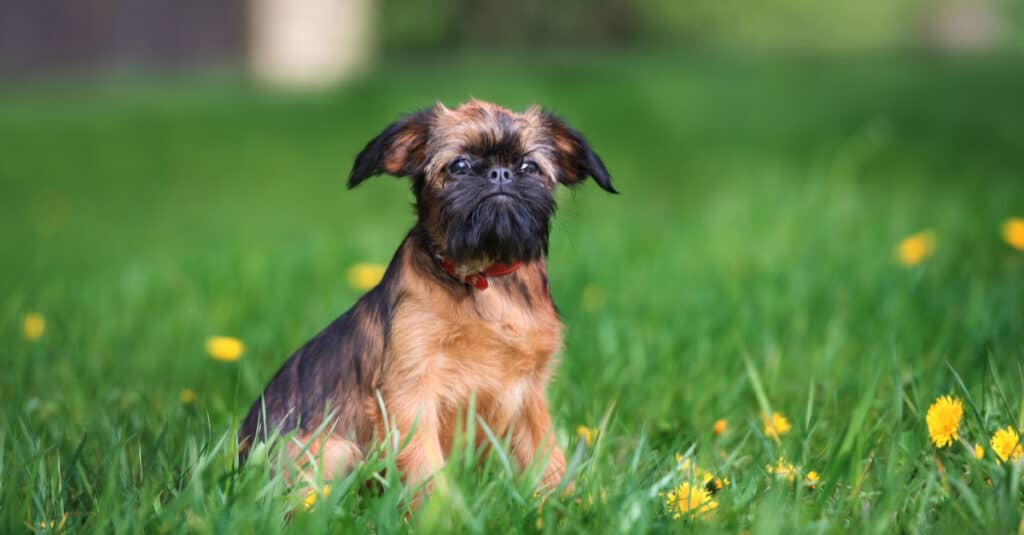
Brussels Griffons love exercise but don’t require a ton of space, making them ideal dogs for apartments or small homes.
©otsphoto/Shutterstock.com
Health and Entertainment for your Brussels Griffon
See all of our expert product reviews.
Size and Weight
The Brussels Griffon is a rather petite dog, which is part of the appeal for owners in apartments or smaller homes. There are no discernable differences between the size of females and males, both ranging from 7-8 inches tall as adults. In fact, they weigh only about 7-12 lbs. when they are fully grown, though some may reach 20 lbs. as the result of the mix of their much larger ancestors.
As a puppy, the Brussels Griffon only weighs a few ounces.
| Height (Male): | 7-8″ |
| Height (Female): | 7-8″ |
| Weight (male): | 7-12 pounds |
| Weight (female): | 7-12 pounds |
Common Health Issues
Most of the health issues that Brussels Griffons tend to deal with are due to their flat face and their short noses, making the concerns common among other breeds with the same traits. Respiratory issues can occur if the airway is obstructed, but the nose can also lead to eye damage. Some of the eye conditions include glaucoma, cataracts, and progressive retinal atrophy.
Their small bone structure is prone to syringomyelia, which causes the spinal cord to collect fluid-filled cavities. They may also experience patellar luxation, hip dysplasia, and thyroid problems.
Since the Brussels Griffon is not meant to be kept outside, they are more prone to heatstroke than larger breeds. Plus, their short hair prevents them from being in weather that is too cold. Keeping them inside is the easiest way to prevent illnesses from environmental factors.
Overall, the most common health issues that you may face with your dog include:
- Respiratory issues
- Eye damage (like glaucoma and cataracts)
- Syringomyelia
- Patellar luxation
- Hip dysplasia
- Thyroid disorders
- Heatstroke
Temperament
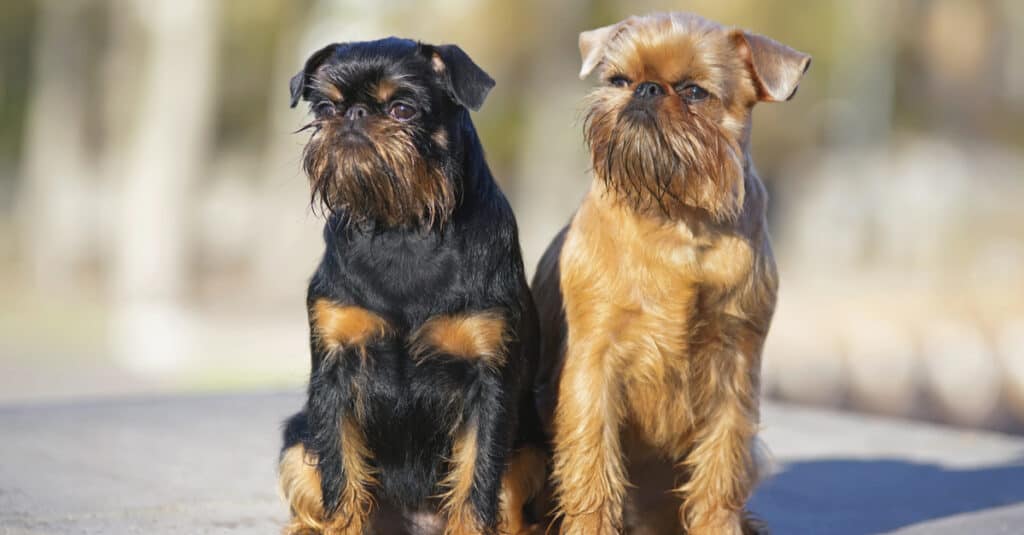
Two Brussels Griffon dogs want to be with their owners all the time, so they can’t be left alone at home much.
©Eudyptula/Shutterstock.com
Anyone lucky enough to adopt one of these pint-sized pups will have a loyal and sensitive companion. Its naturally affectionate personality makes it incredibly appealing, though that affection may seem a bit dependent. It likes to be as physically close to its owner as possible, which means that separation anxiety is in full swing. If it is possible to bring your dog where you go, you should – it will not be happy at home.
The overall temperament can range broadly, from incredibly outgoing to cautiously shy. However, Brussels Griffons are consistently bossy around the home if they are allowed to run the show. If they feel ignored at any point, they may start behaving badly for attention. However, most of their personality has to do with several factors, like how socialized they are, their training, and the genetics that made them. Remember to be patient as you raise this pup to be a well-balanced pet.
Since the Brussels Griffon is more sensitive than most breeds, they pay clear attention to their surroundings. If they become fearful, their behavior may become prematurely aggressive, biting out of the fear that someone will handle them roughly. With gentle care, it is easy to avoid this issue entirely.
Care
As adorable as the Brussels Griffon can be, it needs to have a certain degree of care to remain healthy and happy. Here are a few tips to properly care for this pet when you bring him/her home.
Best Dog Food
Since this breed can be prone to obesity, the right portions of high-quality dog food (1/4 to 1/2 cup) are necessary. They should be fed twice daily, and their food should not be left out to graze on for the entire day. However, water should be left out to ensure that they are hydrated.
In our opinion at A-Z Animals, the best dog food for Brussels Griffons is Wellness CORE Small Breed Dry Dog Food with Wholesome Grains, High Protein Dog Food.
Due to its high protein content from turkey and chicken, and fiber from healthy grains like barley, oatmeal, and quinoa, your dog will stay full rather than overeating. The poultry ingredients also function as great sources of chondroitin sulfate and glucosamine for mobile joints, and there’s taurine for eye and heart health.
Think about adding Wellness CORE Small Breed Wholesome Grains High Protein dog food to your Chewy or Amazon cart.
- Chicken and turkey meal, deboned chicken recipe for small dog breeds
- Levels of taurine for heart health
- Promotes lean muscles and lean body mass
- No legumes, potatoes, fillers, artificial colors or flavors
Maintenance and Grooming
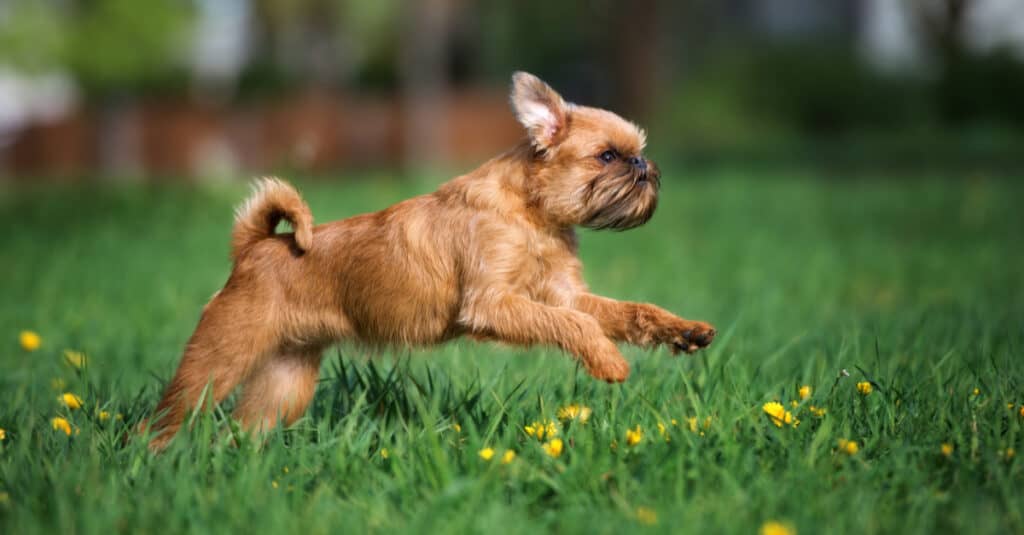
Brussels Griffons will need to have their hair clipped around the face and removed from ear canals.
©otsphoto/Shutterstock.com
Although the Brussels Griffon is a rather small dog with short hair, it requires quite a bit of upkeep. It may have a rough or smooth coat, depending on the variation of the breed. Regardless of the texture, it is best to brush this dog twice a week to eliminate the fur that it sheds. Baths should occur on an as-needed basis.
The Brussels Griffon with the smooth coat won’t need as much attention to grooming as the wirier breeds, but it’ll shed seasonally. Clipping the short hair is also encouraged every three months, especially around the face. Although this dog also will need its hair from the ear canals removed, this type of care can be done with a veterinarian or a groomer.
Training
The Brussels Griffon’s desire to be close to you can be used to your advantage during training. With exposure to different social settings with walks in the park, visits with other people, and interactions with other dogs, you may be able to break its natural shyness around strangers. It tends to enjoy spending time with other pets.
If you are working to teach commands or even just house-train your Brussels Griffon, try to exclusively use positive reinforcement. These puppies are eager to please you, and they want to make you happy. Still, they tend to bark, so they will need a little patience to break this habit.
Exercise
Though the Brussels Griffon is small, it likes a lot of exercise. It should be walked daily, helping it to avoid obesity and keep its stress levels down. Engaging in agility exercises can also fulfill its need for physical activity, especially when temperatures outside are too high for a walk.
Always keep a fenced yard available when you take this dog outside to protect it from predators. However, if you have this type of outdoor area, make sure that there are no sharp objects near the ground that could damage its prominent eyes.
Puppies
Brussels Griffon puppies have a fairly similar demeanor to the adults. When adopting a puppy, you need to have a way for it to interact with other animals and household members early in its life to get the right social skills. It may need a smaller amount of food (1/4 cup) twice a day but purchase the dry food that is specifically meant for this age for the right nutrition.
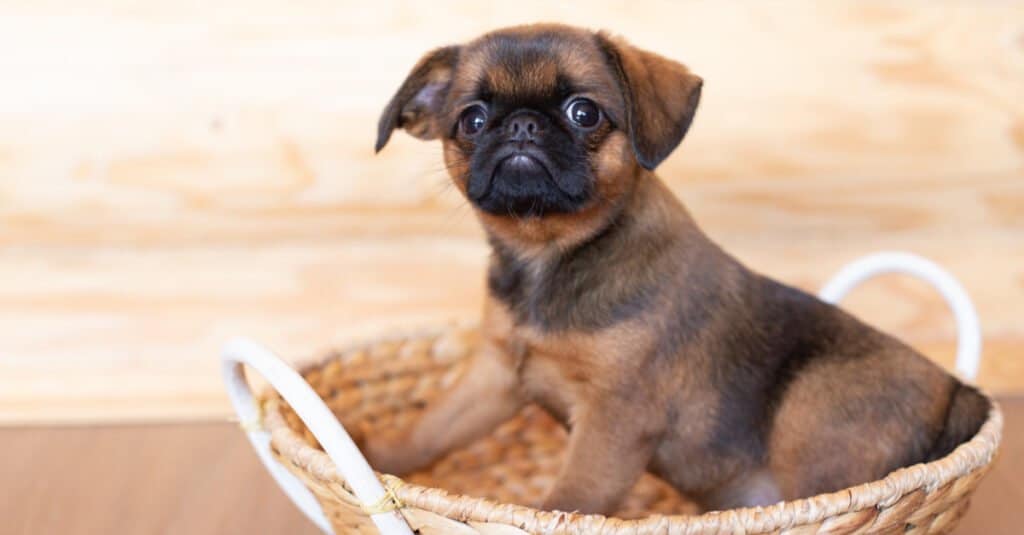
The average litter size of a Brussels Griffon is one to three puppies.
©Natalia Duryagina/Shutterstock.com
Children
The Brussels Griffon is known for its loving demeanor, but it may not be suited for young children who have yet to be taught the proper interactions with dogs. The dog won’t appreciate the unsolicited hugs, and it doesn’t like to stay in someone’s lap unless it decides to. It especially doesn’t love being hit, chased, or cornered, which may result in growling or snapping.
If you have small children, do not allow them to pick up the dog. Instead, encourage them to be patient and wait for attention, demonstrating a welcoming and calm demeanor. If this pup seems uncomfortable at all, give hit a few minutes away from the children to calm down.
Similar Dogs
If the Brussels Griffon just isn’t a good match for your family, there are always the following dogs as well:
- Pekingese – The human-like face is also found in the Pekingese breed, though there is a lot more grooming involved.
- Chinese Crested – The Chinese Crested has significantly less fur, but you’ll still have the unique facial hair of the Brussels Griffon.
- Scottish Terrier – If you like the distinct beard, this sleek and fluffy dog may give the same compact figure you like as well.
Famous
This species is no stranger to Hollywood. In fact, part of the reason that the Brussels Griffon has gained so much popularity is the result of its featured role in As Good As It Gets.
With such a distinct look, several Brussels Griffons are found on Instagram with quite a following, including @DigbyVanWinkle, @DonnieBarko, and @MyNameIsChamaco.
Popular Names
There are plenty of names for this toy breed. Consider one of these names for your next rescue animal:
- Duchess
- Kissy
- Ladybug
- Empress
- Bambi
Brussels Griffon FAQs (Frequently Asked Questions)
What is a Brussels Griffon?
A Brussels Griffon is a combination of several dogs, including the Affenpinscher, English Toy Spaniel, and Pug. Since there are two variations of the Brussels Griffon, they may have a smooth coat or a rough coat. They have large eyes, a round head, and an underjaw that often protrudes over the top jaw. They are highly affectionate but will bite when afraid.
Do Brussels Griffon bark a lot?
This breed is known for barking if they are not properly trained. It is possible to teach them to be quieter, but they still may bark if provoked, afraid, or upset.
How much do Brussels Griffon puppies cost?
For a puppy or adult, the total price will depend on their breeding and where they are adopted from. Adopting from a rescue will be the cheaper option for any animal. However, if pedigree is a priority, breeders can sell these puppies for a price as little as $800 or as high as $3,600.
Are Brussels Griffon easy to train?
It depends. These toy dogs are rather independent, so they may resist training at first, even if they come from the most expensive breeders. Luckily, with positive reinforcement and patience, training is entirely possible.
Do Brussel Griffon dogs shed?
Yes, but not often. Brussels Griffons with a smooth coat only shed seasonally, though they will need to be brushed a few times each week.
How do you groom a Brussels Griffon?
This pet should be washed and towel-dried before grooming. A pin brush is the best grooming tool to eliminate any matting, though most groomers will take the time to trim the feet and face to look tidier. They should also have their teeth brushed regularly.
What's the difference between a Brussels Griffon and an Affenpinscher?
The Brussels Griffon is a mix between an Affenpinscher and a few other small dog breeds. Additionally, the Brussels Griffon is found in more colors compared to the black and gray Affenpinscher.
Thank you for reading! Have some feedback for us? Contact the AZ Animals editorial team.
Sources
- Dogtime, Available here: https://dogtime.com/dog-breeds/brussels-griffon
- DailyPuppy, Available here: https://www.dailypuppy.com/care-brussels-griffon-1233.html
- DailyPuppy, Available here: https://www.dailypuppy.com/groom-brussels-griffon-1522.html
- Hill's Pet, Available here: https://www.hillspet.com/dog-care/dog-breeds/brussels-griffon
- NextDayPets, Available here: https://www.nextdaypets.com/Brussels-Griffon.htm
- ThePaws, Available here: https://www.thepaws.net/85-best-brussels-griffon-dog-names/

